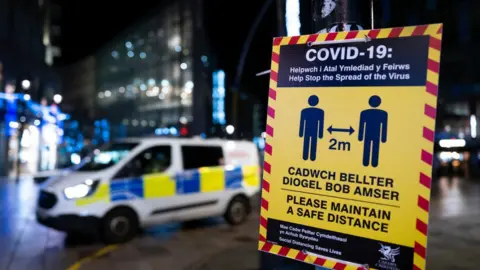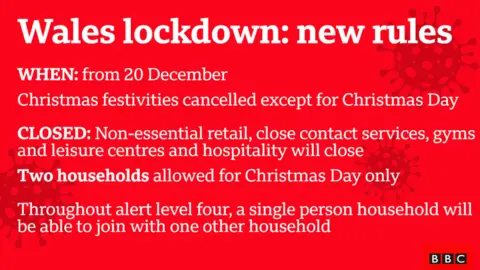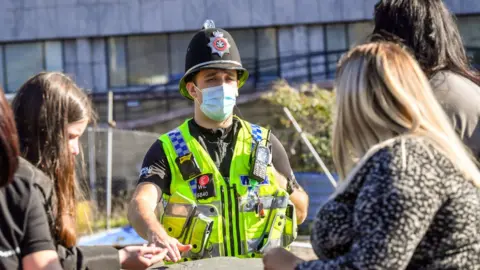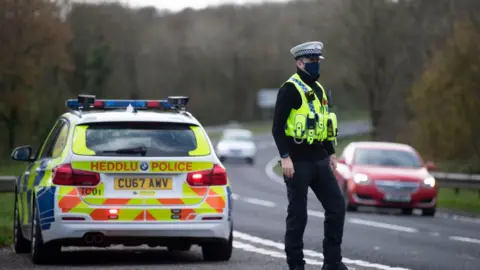Covid: Policing Christmas rule-breakers in Wales 'difficult'
 Getty Images
Getty ImagesTrying to enforce lockdown laws over Christmas could put police at risk of harm and in "difficult" situations, the Welsh Police Federation has warned.
Wales entered the highest level of coronavirus restrictions on Sunday, with two households only allowed to meet on Christmas Day.
Health Minister Vaughan Gething has said he wants to see an "enforcement-first approach" to rule-breakers.
But the body representing police said officers were "under immense pressure".
Mark Jones, of the North Wales Police Federation, said passions would be high at Christmas and officers were trying to balance compassion and enforce laws, while putting themselves at risk of abuse and catching the virus themselves.
Coronavirus laws on travel and meeting others had been due to be relaxed from 23 to 27 December, to allow people to celebrate the festive period with loved ones.
But after concern over a new variant of the virus, Wales was placed in a level four "stay-at-home" lockdown at midnight on Sunday, and festivities cut to just one day - Christmas Day.
Under the law, people will only be able to travel on 25 December to see one other household - plus a single person household - and must return on the same day.
Those in breach of rules face being told to go home or be returned home by officers, and issued with a £60 fine, which rises to £120 for a second breach.

On Sunday, Mr Gething said there was "growing unhappiness and anger" towards people who were "flagrant rule-breakers" during recent months.
Until now, Welsh police forces had focussed on engaging and educating first time offenders, with fines only happening if people were found in breach of rules on multiple occasions.
But Mr Gething said the Welsh Government had spoken to councils and the police, and he wanted to now see an enforcement-first approach.
He told BBC Wales catching people who break the two household limit would be difficult unless they made a lot of noise or neighbours spied on them.
"Where it comes to house parties and more egregious breaches, yes I do expect enforcement to take place. I do expect people to get fined," he said.
"If you go into a house party with 20 different people you know damn well that you're breaking the rules."
Mr Jones, general secretary for the Police Federation in north Wales, said enforcing the rules would be "difficult" as there were no extra officers to deal with new laws under a time of "immense pressure".
He said officers were responding to serious crimes and increased pressures over the festive period - such as a rise in domestic violence - and many officers were already working on rest days and holidays to cover for sick colleagues.
Mr Jones said the majority of the public were supportive of the rules and co-operated with police, but a small minority were "flouting" the law, putting themselves and officers who had to intervene at risk.
"By virtue of the fact they are already disregarding the regulations they are invariably not very happy or compliant with police when being dealt with," he said, adding officers had been deliberately coughed on and spat at.
"These police officers are people, and they are having to get up close and personal and deal with these individuals."
 PA Media
PA MediaHe added that the Christmas rules meant officers would be put "in very difficult" positions as they also wanted to see their loved ones and so understood people's desperation.
"Police don't create the law, they just have to enforce them, which puts them in a no-win situation," he said.
"Officers are human beings, they are doing their very best to walk that tightrope of enforcing the laws of the land, but also trying to balance human compassion and people's feelings, and strong views on the regulations.
"I speak to officers who are really, really worried about bringing this silent killer back into their homes, but they understand they have a duty as a police officer.
"Suddenly it's a police officer who will have no choice but to deal with those people in the most appropriate way, and that will inevitably involve them putting themselves at risk of being assaulted or being attacked."
 Getty Images
Getty ImagesChief Constable Pam Kelly, of Gwent Police, told BBC Radio Wales that officers would not be "knocking on people's doors asking how many people are in a house", but would be enforcing the laws.
She said: "Police officers have had to be going in and out of people's houses throughout this entire pandemic, dealing with assaults, domestic abuse and of course investigating crime, and then they go home to their families.
"So let's reduce the pressure on all services by being really careful over Christmas, let's respect agencies, respect each other so that we reduce the spread of the virus over Christmas.
"If they don't, and they flout the law, of course we will have to enforce the law, but we'd rather not do that."
Dyfed-Powys Police and Crime Commissioner Dafydd Llywelyn said trying to keep an eye on people's movements would be "difficult" over the Christmas break.
Mr Llywelyn said police would not be going "house to house to check" how many people were celebrating together, and emergency and high-risk calls would be a priority over any calls concerning rules being broken.
He told BBC Wales police would be visible in communities and on roads, to provide reassurance, and would be able to stop cars, but this was like any other year, where officers would be focussing on preventing speeding and drink driving.
"The key message here is for people to take personal responsibility in relation to their movements... the guidance is there for a reason, it's to stop the spread of coronavirus," he said.
"Where we do get information that people are flouting the rules, maybe house parties are taking place, the police will be there to respond."
